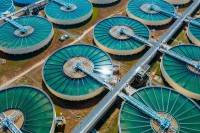
Role of technology in the global water crisis
Published: 25 May, 2022
With water demand projected to increase by up to 30% by 2050, the UN’s prediction of a global water deficit of 40% by 2030 is disturbingly possible. Water makes up three quarters of the Earth’s surface, but 2.2 billion people around the world still lack access to safe drinking water and over half of the global population lack proper sanitation. On top of this, up to 30% of water in Western countries and 70% in emerging countries is lost to leakages and losses. Half of those losses, if saved, would provide enough water to serve at least 90 million people.
Clean water is a fundamental need but bringing this vital resource to people requires a vast network of reservoirs, collectors, purifiers, desalination equipment and other technologies.
ABB believes that intelligent automation technology can make a world of difference in tackling the greatest water challenge in human history. Progress in AI and machine learning will enable the application of innovative digital layers to predict and prevent disruptions of water plants, networks and pipe damages before they happen, saving up to 70% of water loss.
ABB’s integrated automation and electrical systems help control water flows, while sensing equipment detects when fresh water becomes tainted, or leakages need to be fixed. They also help control the decontamination and neutralisation of wastewater to ensure that it is reused and reclaimed sustainably. Water is too precious to waste, so smart water management, across the entire water cycle, is critical to ensure a safe and reliable water supply for all.
w: https://new.abb.com/process-automation/makingaworldofdifference






